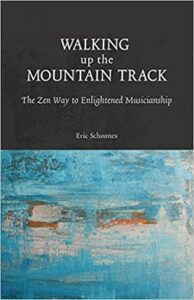The greatest performers in musical history were focused on their craft from the context of a wider landscape – they were more than ‘performers’, weaving their musical expression on a much wider canvas than is the case with those who have a narrower, more mechanical perspective of music.
 Eric Schoones’ book Walking up the Mountain Track is a remarkable exploration of the inner dimensions of the musical artist that examines music-making from a Zen perspective. It features established musicians like Josef Hofmann, Dinu Lipatti, Glenn Gould, Claudio Arrau, Sergiu Celibidache, Yehudi Menuhin, and many others, in creative narratives based on their actual writings and life circumstances in order to provide insight into the mindset and deeper role of the musical interpreter. Insightful and creative presentation of ‘behind the scenes’ scenarios centred around the essays and interviews of legendary artists helps to humanize these exalted musicians, portraying them as actual people with inquiring minds and unwavering dedication to their craft.
Eric Schoones’ book Walking up the Mountain Track is a remarkable exploration of the inner dimensions of the musical artist that examines music-making from a Zen perspective. It features established musicians like Josef Hofmann, Dinu Lipatti, Glenn Gould, Claudio Arrau, Sergiu Celibidache, Yehudi Menuhin, and many others, in creative narratives based on their actual writings and life circumstances in order to provide insight into the mindset and deeper role of the musical interpreter. Insightful and creative presentation of ‘behind the scenes’ scenarios centred around the essays and interviews of legendary artists helps to humanize these exalted musicians, portraying them as actual people with inquiring minds and unwavering dedication to their craft.
As I am an experienced researcher of the legendary pianist Dinu Lipatti – a central figure in this book – I was awe-struck by the utterly believable dramatization of the pianist as he prepared a letter to a South African pianist that was posthumously published and often referred to as his ‘artistic credo.’ While the words of the letter itself had long been familiar to me, the way they were framed by Schoones enabled me to truly feel the presence and personality of Lipatti, in an entirely realistic and convincing way that made me feel as though I was experiencing this revered musician’s thought process up-close and directly. The same with Arturo Benedetti Michelangeli, where Schoones masterfully provides a truly plausible presentation of what the artist may have been thinking as he engaged in a somewhat infamous television interview which has to many appeared cold and uninvolved; one emerges with a newfound respect and understanding for the inner workings of this great pianist.
With astute and educated observations about both Zen and classical music, countless sources are masterfully interwoven into a series of essays that are of profound interest for all lovers of classical music and the art of interpretation. Testimonials of praise on the back of the book from the likes of Maria Joao Pires, Helen Grimaud, Nelson Goerner, and Christa Ludwig are a sign of the esteem in which the book is held by internationally celebrated musical artists who have dedicated their lives to the art form and who could clearly identify with the concepts explored in its pages (you can read them by clicking here). Post-publication statements of support have flowed in as well, a particularly insightful one from collaborative pianist Kelvin Grout (a preferred pianist of Elisabeth Schwarzkopf and Jessye Norman), who stated
I seldom read books on music – they somehow destroy the beauty of the subject and I personally hate new ‘methods’ that appear online virtually every week – so generally I just avoid anything in print on the subject…. here for the first time in print is a more than valid explanation of performance and practise techniques that can only lead to a better understanding of the composer’s intentions and much more. I also believe that the observations revealed within your book could help the ever-increasing number of young pianists suffering stress injuries. It would certainly help if more teachers would open their minds to this world of Zen at the keyboard. Your book will be an inspiration for generations to come and you will find me promoting it whenever and wherever I find the opportunity.
Another astute observation I agree with comes from Pavel Shatskiy of the Moscow State Conservatory, who states that this book
… differs (as it seems to me) from many ones produced in which the so called “scientific approach” kills the natural scent and flavouring of a conversation, an interview and finally a living person. And the latter is much harder to achieve. So, it’s a great victory of a journalist and a music writer.
Christian A. Pohl, Director of the International Mendelssohn Academy Leipzig (among other distinguished roles), writes
Hundreds of carefully selected quotations from the greatest in their field are sensitively woven by Schoones into a work of art through which his central concern takes shape: To recognize the wisdom of Eastern philosophies in Western music-making practice. The reading of his book is astonishingly entertaining. Schoones knows how to express his own thoughts and feelings through quotations from the greats. He quietly steps back as an author behind the quotations. And yet his sometimes philosophical, sometimes didactic, sometimes pedagogical message is conveyed impressively and powerfully.
You can order a digital version here and my colleague Mark Anderson in Vancouver, Canada has offered to distribute the limited number of available copies of this remarkable book in North America. It is available for $45 Canadian plus postage, or for $35 US plus postage. To obtain a copy, you can email Anderson at everynotecounts(at)gmail(dot)com and he will reply with details about payment and shipping.